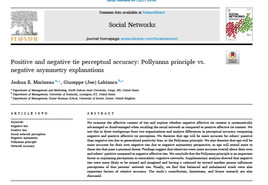Most recent research activity |
|
 I recently had an article accepted for publication at the journal Social Networks with my co-author Joe Labianca, entitled: Positive and negative tie perceptual accuracy: Pollyanna principle vs. negative asymmetry explanations. This paper is based on my research on social network cognition, or people's perceptions of the social relationships around them. Here we examine how people are able to accurately perceive positive compared to negative relationships at work. Long story short, people are much worse at recalling negative relationships (dislike) than positive relationships (friendship). This is the first paper to really delve into this comparison and has ramifications for work in a variety of areas. https://doi.org/10.1016/j.socnet.2020.07.008 Abstract is below: AbstractWe examine the affective content of ties and explore whether negative affective tie
content is systematically advantaged or disadvantaged when recalling the social network as compared to positive affective tie content. We test this in three workgroups from two organizations and analyze differences in perceptual accuracy comparing negative and positive affective tie perception. We theorize that ego will be more accurate for others’ positive than negative ties due to generalized positivity bias, or the Pollyanna principle. We also theorize that ego will be more accurate for their own negative ties due to negative asymmetry perspective, as ego will attend more to those ties that pose a personal threat. Findings suggest that observers were more accurate overall about their own and others’ positive compared to negative affective ties. We conclude that the Pollyanna principle is an important factor in explaining perceptions in naturalistic cognitive networks. Supplementary analysis showed that negative ties were more likely to be missed and imagined and having a valenced tie toward another person influences perceptions of that persons’ network ties. Finally, we find that balanced and imbalanced triads were also important factors of relative accuracy. The study’s contribution, limitations, and future research are also discussed.
1 Comment
|
AuthorDr. Josh Marineau ArchivesCategories |
 RSS Feed
RSS Feed